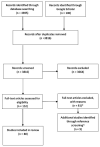How effective are interventions in optimizing workplace mental health and well-being? A scoping review of reviews and evidence map
- PMID: 36944242
- PMCID: PMC10713995
- DOI: 10.5271/sjweh.4087
How effective are interventions in optimizing workplace mental health and well-being? A scoping review of reviews and evidence map
Abstract
Objectives: Mental well-being is critical to quality of life. Workplace mental well-being is crucial to ensure employee health, satisfaction, and performance. Mental ill-health is a global challenge, costing workplaces $17 billion per year. Workplaces have realized the need for investment in interventions to promote mental health and well-being in their workforce. However, given their limited resources, workplace personnel responsible for program implementation need evidence-based guidance on which interventions influence which outcomes.
Methods: This study employed a scoping review methodology in order to produce an evidence map and includes reviews of workplace mental well-being interventions. The search strategy focused on peer-reviewed articles with the primary aim of investigating workplace mental health interventions. Reviews were assessed for quality using AMSTAR 2. The evidence map includes interventions (rows) and outcomes (columns), with the relative size of the reviews underpinning each intersection represented by circles and the direction of evidence represented by color.
Results: Eighty reviews were deemed eligible from 4795 citations. The resulting evidence map includes 17 intervention types designed to influence 12 outcomes. Interventions with the highest quality evidence were mindfulness, education and information provision, and individual psychological therapies. The most common outcomes were burnout / stress reduction and mental well-being. Interventions tended to focus on individual level factors rather than organizational or system-level factors.
Conclusion: The evidence-base for workplace mental health interventions is broad and extensive. There is an apparent knowledge-to-practice gap, presenting challenges to implementing workplace mental health programs (ie, what interventions have the highest quality evidence). This study aims to fill the gap by providing an interactive evidence-map. Future research should look to fill the gaps within the map including the lack of organization and system level factors and especially economic evaluations.
Conflict of interest statement
The authors declare no conflicts of interest.
Figures

Similar articles
-
The effectiveness of mindfulness based programs in reducing stress experienced by nurses in adult hospital settings: a systematic review of quantitative evidence protocol.JBI Database System Rev Implement Rep. 2015 Oct;13(10):21-9. doi: 10.11124/jbisrir-2015-2380. JBI Database System Rev Implement Rep. 2015. PMID: 26571279
-
Developing a framework for evaluation: a Theory of Change for complex workplace mental health interventions.BMC Public Health. 2023 Jun 17;23(1):1171. doi: 10.1186/s12889-023-16092-x. BMC Public Health. 2023. PMID: 37330460 Free PMC article.
-
Mindfulness meditation for workplace wellness: An evidence map.Work. 2019;63(2):205-218. doi: 10.3233/WOR-192922. Work. 2019. PMID: 31156202 Free PMC article.
-
Workplace-based interventions to promote healthy lifestyles in the NHS workforce: a rapid scoping and evidence map.Southampton (UK): NIHR Journals Library; 2020 Apr. Southampton (UK): NIHR Journals Library; 2020 Apr. PMID: 32271516 Free Books & Documents. Review.
-
Workplace-Based Organizational Interventions Promoting Mental Health and Happiness among Healthcare Workers: A Realist Review.Int J Environ Res Public Health. 2019 Nov 11;16(22):4396. doi: 10.3390/ijerph16224396. Int J Environ Res Public Health. 2019. PMID: 31717906 Free PMC article. Review.
Cited by
-
How to improve intervention research on the psychosocial work environment?Scand J Work Environ Health. 2023 Jul 1;49(5):311-313. doi: 10.5271/sjweh.4107. Epub 2023 Jun 25. Scand J Work Environ Health. 2023. PMID: 37389964 Free PMC article. No abstract available.
-
Mental health and well-being at the workplace.Indian J Psychiatry. 2024 Jan;66(Suppl 2):S353-S364. doi: 10.4103/indianjpsychiatry.indianjpsychiatry_608_23. Epub 2024 Jan 24. Indian J Psychiatry. 2024. PMID: 38445278 Free PMC article. No abstract available.
-
Fifty years of research on psychosocial working conditions and health: From promise to practice.Scand J Work Environ Health. 2024 Sep 1;50(6):395-405. doi: 10.5271/sjweh.4180. Epub 2024 Aug 7. Scand J Work Environ Health. 2024. PMID: 39110008 Free PMC article. Review.
-
Fifty years of research in the Scandinavian Journal of Work, Environment & Health.Scand J Work Environ Health. 2024 Jan 1;50(1):3-10. doi: 10.5271/sjweh.4135. Epub 2023 Dec 6. Scand J Work Environ Health. 2024. PMID: 38054807 Free PMC article.
-
Occupational, academic, and personal determinants of wellbeing and psychological distress in residents: results of a survey in Lyon, France.Front Psychol. 2024 May 6;15:1347513. doi: 10.3389/fpsyg.2024.1347513. eCollection 2024. Front Psychol. 2024. PMID: 38770261 Free PMC article.
References
-
- World Health Organization. Mental health: strengthening our response [Internet]. 2018. Available from: https://www.who.int/news-room/fact-sheets/detail/mental-health-strengthe...
-
- Gable SL, Haidt J. What (and why) is positive psychology? Rev Gen Psychol 2005. Jun;9(2):103–10. 10.1037/1089-2680.9.2.103 - DOI
Publication types
MeSH terms
LinkOut - more resources
Full Text Sources
Miscellaneous

